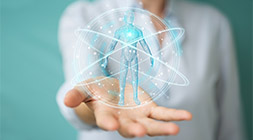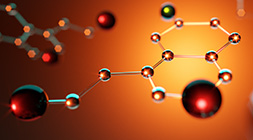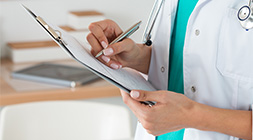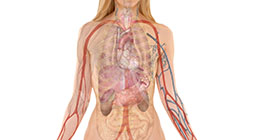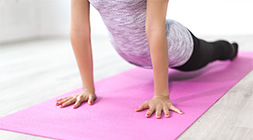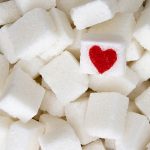
Overview
Symptoms
Causes
Prescription
Health Tips
Imagine trying to squeeze dish washing liquid through a bottle dispenser that has become caked and blocked with solidified soap. Each pump and squeeze become more difficult and any liquid that comes out spurts out erratically.
A similar disturbance occurs in the bodies of one in three Americans and one in five Canadians with high blood pressure, or hypertension. In this common condition, the heart muscle contracts too forcefully and sends blood driving through the body with excess strength. Clogged arteries create additional resistance that cause damage in the sensitive inner endothelium layer. This “wear and tear” promotes the plaque buildup that leads to heart disease. People with high blood pressure are more than twice as likely to have a heart attack compared to people with normal blood pressure. Hypertension also strains and eventually weakens the heart, while very high blood pressure may cause blood vessels to burst in the brain, causing a stroke.
Long-term studies are indicating that hypertension medications cause side effects that actually increase the risk of heart attack. Other studies are showing that in the borderline and mild cases, drugs have no therapeutic value and only increase risks. Although medical practitioners agree that drug intervention is unnecessary at the borderline and mild stage, medication is still prescribed. Michael Murray, ND, explains in his book, Heart Disease and High Blood Pressure, that yearly sales of blood pressure-lowering drugs are estimated to be greater than $10 billion. As approximately 50 percent of cases are borderline or mild, these drug manufacturers would lose half of their hypertension drug revenue if people were to follow natural therapies instead.
Symptoms
Many people with high blood pressure will not have symptoms, or know they have high blood pressure. Often, the first symptom is a heart attack.
Some possible symptoms of extremely high blood pressure include:
- Confusion
- Dizziness
- Frequent nosebleeds
- Headaches
- Vision problems
Causes
High blood pressure falls into two categories, primary and secondary. Many factors can lead to primary high blood pressure, including genetics, hardening of the arteries, high cholesterol, smoking, Type A personality, poor stress coping abilities, obesity, and lack of exercise. Nutritional deficiencies, or a poor diet that emphasizes salt, sugar, caffeine, and refined carbohydrates will elevate blood pressure. Excessive dieting or alcohol consumption may also contribute to hypertension.
Secondary high blood pressure is due to underlying health conditions, such as thyroid issues, heart defects, adrenal tumours, kidney problems, or the use of prescription drugs (including birth control pills), and over-the-counter pain or cold medications. High levels of heavy metals such as cadmium and lead have been found in those with hypertension.
Prescription for Health
Diet
Diet is very important for people with high blood pressure. To lower blood pressure, include more fresh fruits and vegetables (seven to ten servings daily), such as celery, onions, beets, green leafy vegetables, berries, and citrus fruits. Vegetarians have fewer problems with blood pressure than meat-eaters, so when choosing protein, try opting for more fiber, nuts and seeds, legumes, and wild cold-water fishes, such as salmon and mackerel. Use garlic liberally with meals.
A common imbalance found in people with high blood pressure is the wrong ratio of potassium to salt. Reduce sodium intake by avoiding table salt and processed foods. Increase intake of potassium-rich foods such as bananas, apricots, tomatoes, avocados, potatoes, lean chicken meat, and fresh fish.
Dining out can be overwhelming when trying to follow a heart-smart diet. Look for dishes that are broiled, poached, roasted, and grilled, and ask that dressings, gravies, and sauces be served on the side to retain control over the amount consumed.
| Nutrient | Dosage | Action |
|---|---|---|
| Coenzyme Q10 | 30–360 mg twice daily | Dramatically lowers systolic blood pressure by 16.6 mg/Hg and 8.2 mm drop in diastolic pressure and reduce heart muscle thickening |
| French maritime pine bark | 125 mg daily | Lowers blood pressure by blocking angiotensin, converting enzyme ACE similar to ace inhibitor medications. Also lowers hemoglobin Alc and elevated blood sugar |
| Vitamin D3 | 5000 to 10 000 IU daily | Lowers blood pressure, ACE inhibitors by lowering renin |
| Magnesium bisglycinate | 500 mg per daily | Conclusively shown to dramatically lower 20.4 mmHg drop in systolic BP and 8.7mmHg drop in diastolic pressure |
| Omega-3 fatty acid | 1000 to 3000 mg daily | Reduces blood pressure by blocking the angiotensin system and relaxing arteries and reduce constriction factors. Reduces aortic stiffness. |
| Vitamin B3 (inositol hexanicotinate, nonflushing niacin) | 500 mg three times daily | Aids circulation, lowers cholesterol and blood pressure |
| Vitamin C | 1000 mg three times daily | Dilates blood vessels, strengthens walls, promotes excretion of lead |
| Vitamin E (d-alpha tocopherol) | 100–400 IU daily | Slows progression of arteriosclerosis and thins blood |
| Potassium | 500 mg daily, plus plenty of potassium-rich foods | Maintains blood pressure and reduces calcium loss |
| Melatonin | 2 to 3 mg at bedtime | Reduces blood pressure during sleep systolic by 6 mmHg and diastolic by 4 mmHg |
Health Tips to Enhance Healing
- An occasional glass of red wine may be beneficial, but more than one alcoholic drink per day should be avoided.
- Avoid eating animal fats and substitute plant fats instead.
- Avoid sugar, aspartame and other artificial sweeteners. Use stevia instead, available from health food stores.
- Drink plenty of pure, filtered water daily.
- Get sufficient sleep and relaxation time; practice relaxation techniques such as visualization, deep breathing, or biofeedback to concentrate on lowering blood pressure specifically, and healing the damage that stress has caused.
- Have kidney function tested. Often, high blood pressure is a symptom of kidney insufficiency.
- Increase intake of potassium-rich foods.
- Increase vegetable intake.
- Losing extra pounds can help reduce stress on the heart. Exercise for 30 minutes three times a week for lowering blood pressure. Exercise may also reduce the risk of stroke and heart attack by over 25 percent.
- Reduce sodium intake by avoiding non-iodized table salt and processed foods.
- Stop smoking and reduce caffeine consumption.
- Use garlic liberally with meals.
- When dining out order dishes that are broiled, poached, roasted, or grilled. Ask for dressings, gravies, and sauces to be served on the side to control portions.

